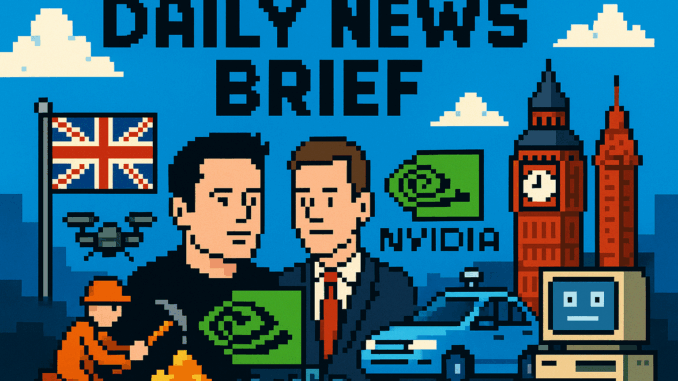
UK Tech Leaders Dispute Elon Musk’s AI Job Forecasts
Source: MSN
At London Tech Week, Science and Technology Secretary Peter Kyle downplayed Elon Musk’s bleak predictions on AI and jobs. With the UK investing £1.2 billion in reskilling, the Skills England initiative hopes to fill digital talent gaps. Meanwhile, NVIDIA will boost its UK presence, announcing plans with PM Keir Starmer to extend AI lab capabilities. High-level discussions with Google DeepMind’s Demis Hassabis and Faculty AI’s Angie Ma stress aligning tech advancement with policy strategies. It’s a bit reminiscent of the Y2K worry back in the ’90s — but this time, the government seems to have an Amstrad-flavoured plan in place for retraining and innovation.
NVIDIA Teams Up with UK for AI Expansion at London Tech Week
Source: TechRepublic
NVIDIA’s London Tech Week keynote was more momentous than a ZX Spectrum launch, highlighting GPU partnerships with UK firms and AI training networks under Keir Starmer’s post-Brexit economic vision. By tripling the Bristol AI lab’s size and funding university projects, the UK looks to step out from under the shadow of foreign tech infrastructure. Remember those home computer skirmishes of the ’80s? This is the modern, tensor core twist on preserving tech sovereignty.
Opening Defence Doors: SMEs to Tackle AI and Drones
Source: BM Magazine
The UK defence sector is rolling out a £150 million fund, offering SMEs the chance to innovate with AI and autonomous tech. Contracts up for grabs will enhance the UK’s non-traditional defence capabilities, inspired by Ukraine’s tech-savvy approaches. With a nod to cyberpunk imaginations à la Neuromancer, we’re transitioning from the Cold War to the brave new era of startup-led technology in national security.
Self-Driving Ubers Set to Hit UK Roads Soon
Source: MSN
Starting spring 2026, London will welcome driverless Ubers, making those futuristic KITT dreams more reality than television. Thanks to NVIDIA Drive Thor chips, these taxis will navigate predefined routes across old dial-up internet zones like Canary Wharf. It’s all very retro-futuristic, a blend of Network Q RAC Rally and algorithmic wizardry to get us from A to B with no human hands on the wheel.
UK Tech Sector Investments Promise Job Boom
Source: MSN
Newport’s semiconductor plant and Manchester’s innovation district are set for a financial boost, with £340 million in funding aimed at carving out 740 new jobs. Echoing the ’80s Youth Training schemes, but with a tech twist, the plan includes retrofitting old power stations as data fortresses. It’s a proper ZX Spectrum-style evolution from the old coal mines to the digital gold of today.
Today in Tech History: When Wrist-Worn Computers Were Novel
Ten years before Jony Ive’s vision of the Apple Watch, Seiko introduced us to the Ruputer on this day in 1998. This pioneering wearable PC watch predated today’s smart devices, with its clunky 3.6 MHz processor and 2MB storage capacity, forcing us to rethink computing-on-the-go much like an early Space Invaders arcade machine might. Its monochrome screen and joystick navigation resembled more a technological curiosity than practical utility, yet it paved the way for today’s digital wristwear.
In an era where dial-up still buzzed like an angry bee, the Ruputer hinted at the possibility of computing freedom beyond the desktop. Although its execution was limited by the rudimentary miniaturisation of its day, it represented a bold foreshadowing of our sleek and ubiquitous wearables. A pebble in the pond of tech innovation, its ripples echo in the Fitbits and Apple Watches we barely think twice about today. As we convene for yet another London Tech Week with its focus on cutting-edge tech, it’s a timely reminder: innovation often starts as a whisper before making its mark.

Leave a Reply